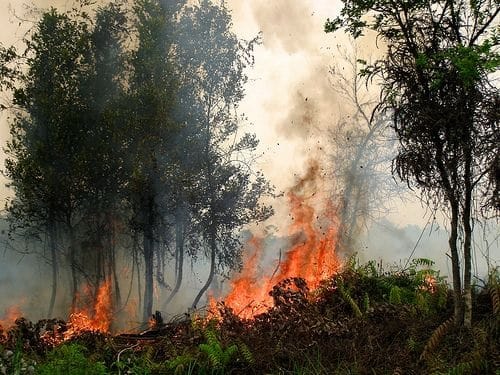The random bush fires that occurred in Singapore this month are a small reminder of the large-scale fires currently raging in Sumatra.
Global demand for food drives the expansion of the agro-forestry sectors, including palm oil, timber, coffee, rice and sugar, in Southeast Asia. In particular, the palm oil sector has grown significantly over the last decade. Indonesia and Malaysia are the crop’s top producers and exporters globally. Using slash-and-burn techniques to clear land for these crops is the underlying cause for the transboundary haze that shrouds Singapore periodically. Such fires can also spontaneously occur with extreme dry weather and get out of control.
The haze problem looks to be even more severe this year. Already, the number of hotspots registered in Indonesia in the first three months of this year is comparable to the total last year, when PSI levels hit a peak of 400 in Singapore. So far, Singapore has been spared the worst of this year’s haze, simply because of favourable wind directions. Indonesia, however, has not been as lucky, with Pekanbaru suffering the brunt of high PSI levels in recent weeks. Even Jakarta experienced a short period of haze from fires in Kalimantan.
The haze is a menace that is here to stay unless greater political will is exerted by governments. At the crux of the issue is the ASEAN Transboundary Haze Agreement, which Indonesia has yet to ratify. The majority of its Parliament recently expressed a willingness to do so, which is to be welcomed. Indonesia’s ratification, if it happens, signals its intention to come down harder on errant companies and smallholders responsible for the fires and the haze. Critics, however, remain sceptical about local enforcement.
President Susilo Bambang Yudhoyono has resolved to combat the problems instead of leaving it to the next administration, which is slated to take over after July’s presidential election. His recent intervention in Sumatra fires, including a promise to take over disaster management if all else fails, shows his determination to get the house in order.
Singapore has shown a heightened commitment towards nabbing the culprits that have been employing these slash-and-burn agricultural methods for commercial gains. A Transboundary Haze Pollution Bill was introduced this month and, if passed, should come into force later this year. The law will have jurisprudence over Singapore and non-Singapore entities, allow fines to be imposed and even allow individuals aggrieved by the haze to take action against polluting entities.
In tandem, Singapore has appointed an International Advisory Panel on Transboundary Pollution, which will advise the Republic on international law relating to transboundary pollution and practical steps to adopt.
It is encouraging that countries are making new efforts to tame the haze beast. However, it would be a grave mistake to think that governments alone can solve all problems.
There are practical limits as to what governments can do. Ultimately, the complexities related to the haze are best understood by the local authorities, companies and non-governmental organisations (NGOs) on the ground, with the capacity and means to act. At the core are over two million smallholders in Indonesia that need better support to produce certified and sustainable palm oil, among other issues to contend
With this in mind, the Singapore Institute of International Affairs is organising a Singapore Dialogue on Sustainable World Resources (SWR) on 20 May this year. The event will bring together policy makers, business leaders and NGOs from the region to work collectively on finding a long-term solution to the haze.




